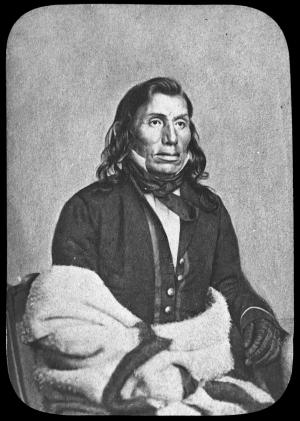 "We have waited a long time. The money is ours, but we cannot get it. We have no food, but here are these stores, filled with food. We ask that you, the agent, make some arrangement by which we can get food from the stores, or else we may take our own way to keep ourselves from starving. When men are hungry they help themselves"
"We have waited a long time. The money is ours, but we cannot get it. We have no food, but here are these stores, filled with food. We ask that you, the agent, make some arrangement by which we can get food from the stores, or else we may take our own way to keep ourselves from starving. When men are hungry they help themselves"
Taoyateduta, 1862
Taoyateduta (which translates as "His Scarlet Nation," though he was more often known as Little Crow, after his father) was born into the Mdewakanton village of Kaposia about 1810. He succeeded his father as leader in 1846. During the 1850s, he was widely recognized as a spokesperson for all the Lower bands of Dakota. He was a negotiator and signer of the Treaty of Mendota in 1851 and the Treaty of 1858. By the 1860s, Little Crow had adopted some European customs — he owned some European-styled clothing, for example, and he lived in a wood-frame house. But like most Dakota farmers on the Lower reservation, he staunchly refused to compromise his Dakota religious beliefs.
Folwell, William Watts. History of Minnesota. St. Paul: Minnesota Historical Society Press, 1961.
National Archives Record Group 393. Western Division, Part I, Dept. of NW.3481
Russo, Priscilla Ann. The Time to Speak is Over: The Onset of the Sioux Uprising. Minnesota History (Fall 1976): 97-106.
Anderson, Gary Clayton. Little Crow: Spokesman for the Sioux. St. Paul: Minnesota Historical Society Press, 1986.
Anderson, Gary Clayton and Alan R. Woolworth, eds. Through Dakota Eyes: Narrative Accounts of the Minnesota Indian War of 1862. St. Paul: Minnesota Historical Society Press, 1988.
Primary
Anderson, Gary Clayton and Alan R. Woolworth, eds. Through Dakota Eyes: Narrative Accounts of the Minnesota Indian War of 1862. St. Paul: Minnesota Historical Society Press, 1988.
Secondary
Anderson, Gary Clayton. Little Crow: Spokesman for the Sioux. St. Paul: Minnesota Historical Society Press, 1986.




